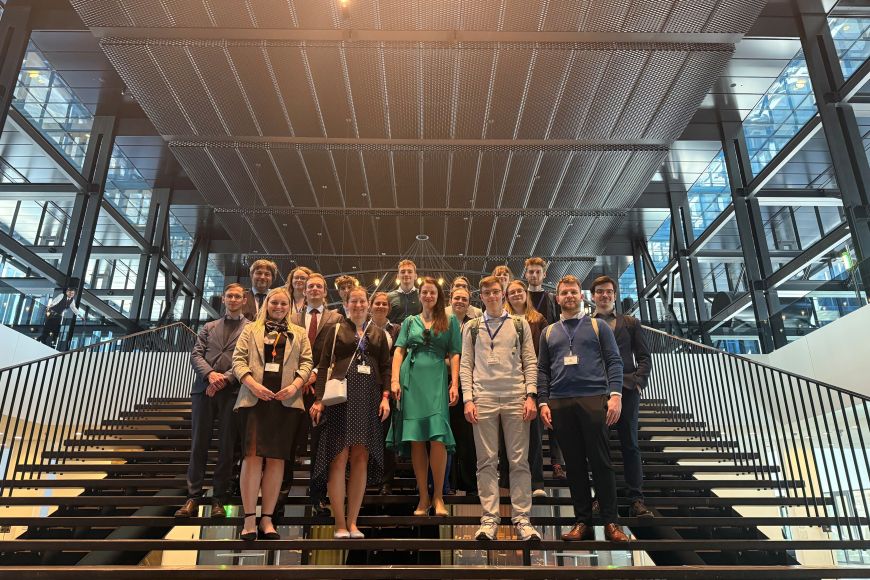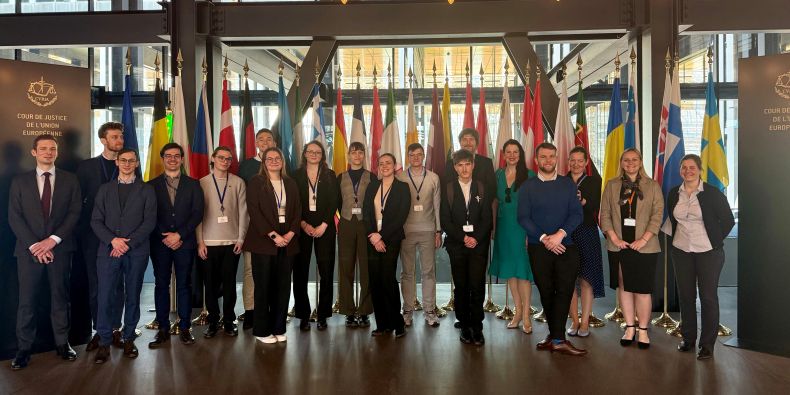From 6 to 9 February, Masaryk University had the opportunity to present itself, the city of Brno and its institutions for the first time at the European Law Moot Court (ELMC). “It is an international competition that takes place every year in four cities in Europe or possibly in the United States. For the organisers, it is an opportunity to welcome twelve international teams and showcase their university, city and courts. That is why we thought it would be a good idea to hold it in Brno,” said Zuzana Vikarská from the Department of Constitutional Law and Political Science.
The ELMC is a high-profile “moot court” – simulated court proceedings – in the field of EU law, which allows students to experience what it is like to defend the interests of their clients before the Court of Justice of the European Union (CJEU). Each year, up to a hundred teams of three or four students enter the competition. Forty-eight teams qualify for the regional finals after submitting their written work, and twelve teams compete in each regional final, which this year took place in Helsinki, Barcelona, Lyon and Brno. The main organisers of the Brno final were Zuzana Vikarská and Natálie Dřínovská. With the help of twelve students, they managed to prepare the competition for over 60 foreign participants who came to Brno from Madrid, London, Paris, Lille, Brussels, Rotterdam, Geneva, Milan, Ljubljana, Stockholm, Cluj and Nicosia.
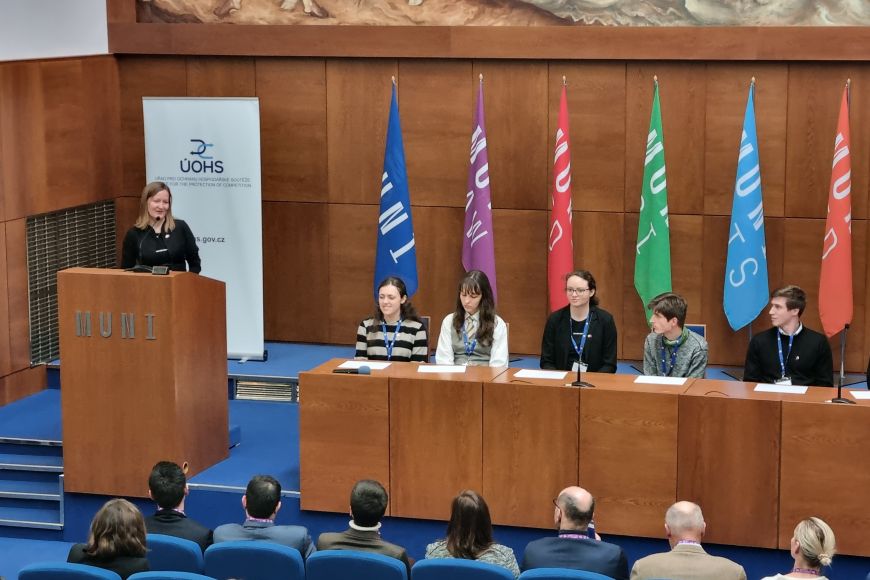
Becoming the organiser of a regional round, as the Faculty of Law did this year in cooperation with the Czech Supreme Administrative Court and Constitutional Court, is not an easy task. This was only the second time in ten years that the competition was held in the Czech Republic. “It is all based on personal connections and networking. I entered the competition as a student during my Erasmus year in Belgium. When I joined the competition as a coach about ten years later, the organisers, who had been the same for many years, wondered why Brno had not yet entered the competition. As they like to visit new places, they asked if we would like to organise the competition in the future,” added Vikarská.
The competition rules stipulate that the organising country cannot compete on its home turf. As a result, MUNI students did not take part in the Brno final. Instead, they helped with the organisation and saw how the competition was run. Jaromír Chroustovský and Ondřej Halátek, who took part in the ELMC in Barcelona two years ago, also worked in the student organisation team this year. “It was about communicating with the competing teams and with the judges. We helped them get to the hotel, to the venue of the competition – that is to say the court building – or Ondřej and I did the timekeeping during the simulated court hearings,” Jaromír said.
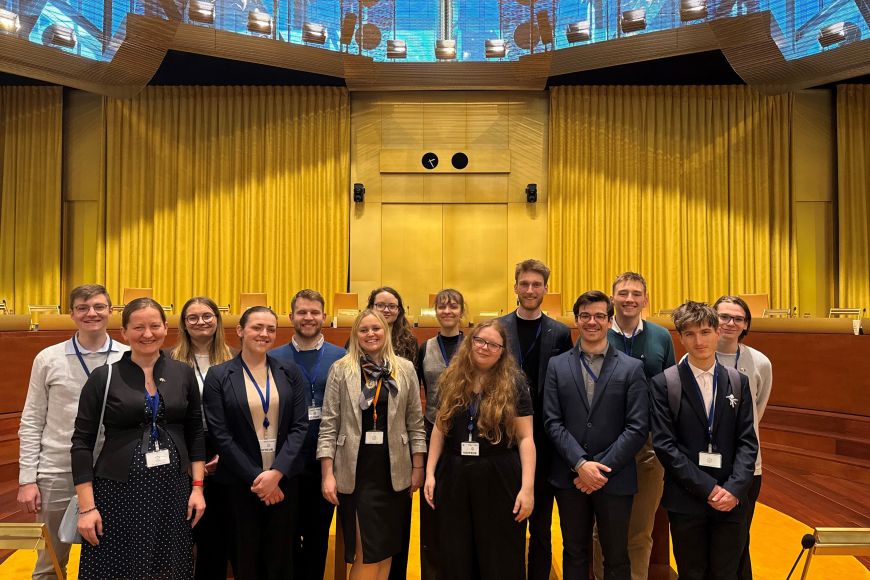
While lawyers can use their mother tongue before the real Court of Justice, ELMC participants must be able to speak in both English and French. There is a reason for the language proficiency test – French is the working language of the CJEU and English has been selected as the language of the competition. “Knowing both languages is challenging. Contestants are usually fluent in English but can expect to be asked questions in French. They can, however, answer in English,” said Ondřej. “It is important to have an active knowledge of one language and at least a passive knowledge of the other. If a contestant knows both, he gets extra points. Of course, this does not apply to native speakers,” added Jaromír.
Although contestants in the ELMC do not experience the reality of losing or winning their client’s case, there is plenty of nervousness as they present their arguments to an experienced panel of ten judges. It is imperative that they give their best. “Most of the time, the simulated case involves controversial issues in EU law, and the EMLC seeks to clarify these points of contention. The debate is directed to make it intellectually interesting and challenging. The contestants feel pressure to present themselves in the best light so that the judges are interested in talking to them,” explains Jaromír.
Competition law, prohibited agreements between undertakings and abuse of dominance were the focus of this year’s event. The Brno final presented a case from the European Union’s common market, specifically the production of chocolate and its transport across the EU and neighbouring countries. “In the oral round, the team has three members and the fourth is an assistant. Participants play the role of either the applicant, the defendant or the advocate general. Participants always speak for themselves, but they may have an assistant, who does not speak but, for example, passes on documents. Each person has 20 minutes to defend themselves alone. However, they prepare as a team, and everyone should know the arguments for both sides and the answers to all possible questions. The points earned are then added up, so in the end it’s about the overall strength of the team,” said Ondřej about his experience in the competition.
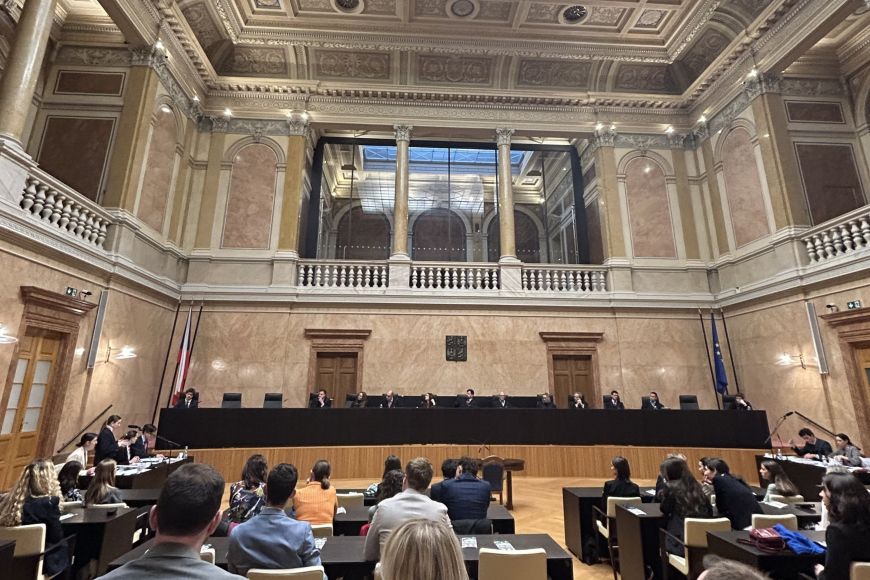
Usually the competition is held at a university on one day and a court on the other, but the Brno round was unusual – thanks to a memorandum of cooperation, it was held in the premises of the two highest Czech courts. “The opening ceremony, attended by Dean Martin Škop, took place in the Karel Engliš Auditorium at the Faculty of Law, while the competition itself was held in the conference rooms of the Supreme Administrative Court and the Constitutional Court. It is clear from the enthusiastic response of many participants that Brno has surprised the international community in a very positive way,” confirmed Vikarská. The ELMC Finals between the winning teams from the regional rounds will take place directly at the Court of Justice of the European Union in Luxembourg. As a reward, the students who helped organise this year’s Brno round will be there as spectators.
The event was organised with the financial support of the Brno City Hall and law firms Giese & Partner, Bříza & Trubač, Dentons and HAVEL & PARTNERS. It was also supported by the Office for the Protection of Competition, the Representation of the European Commission in the Czech Republic and the Czech Society for European and Comparative Law (ČSESP).
